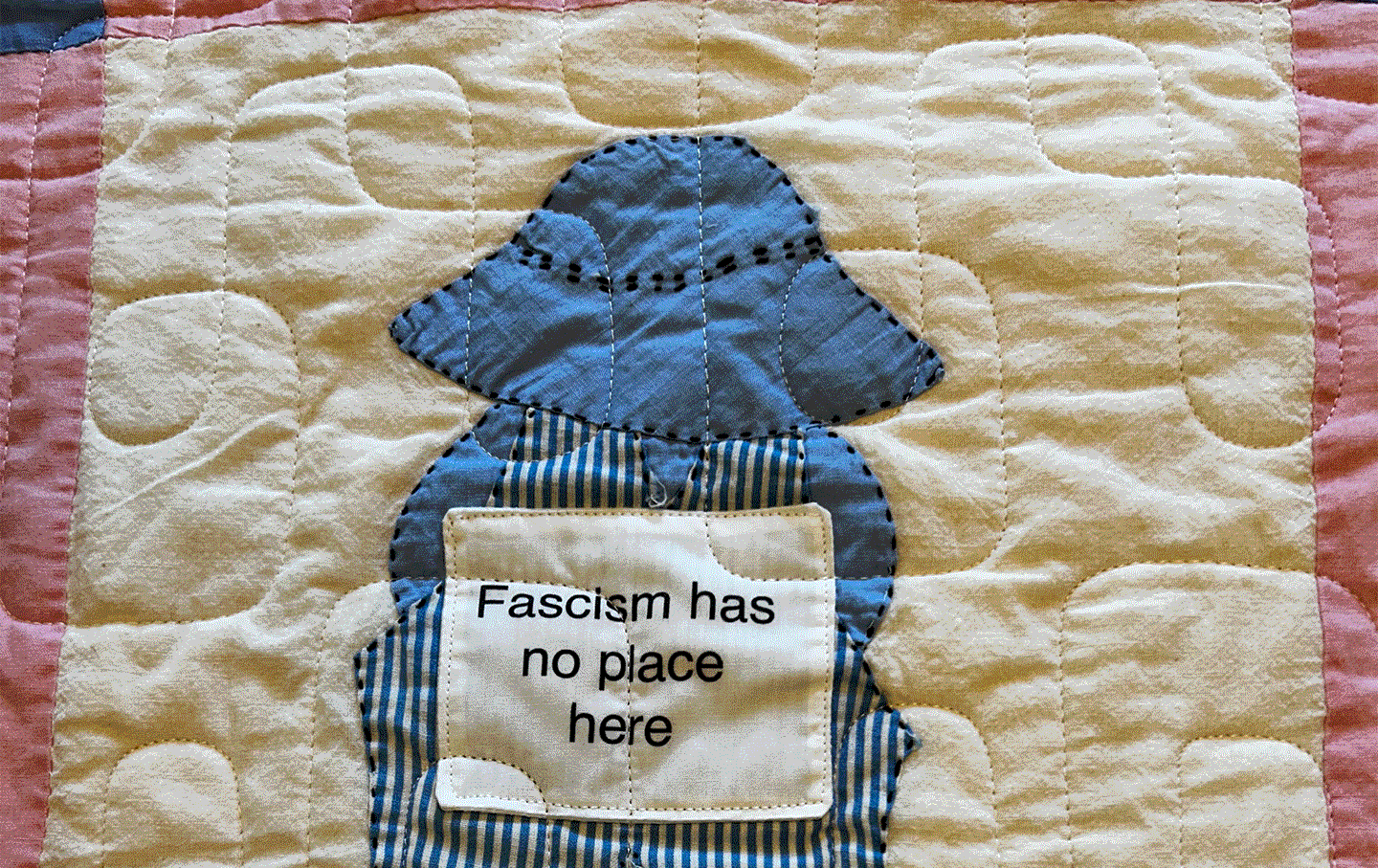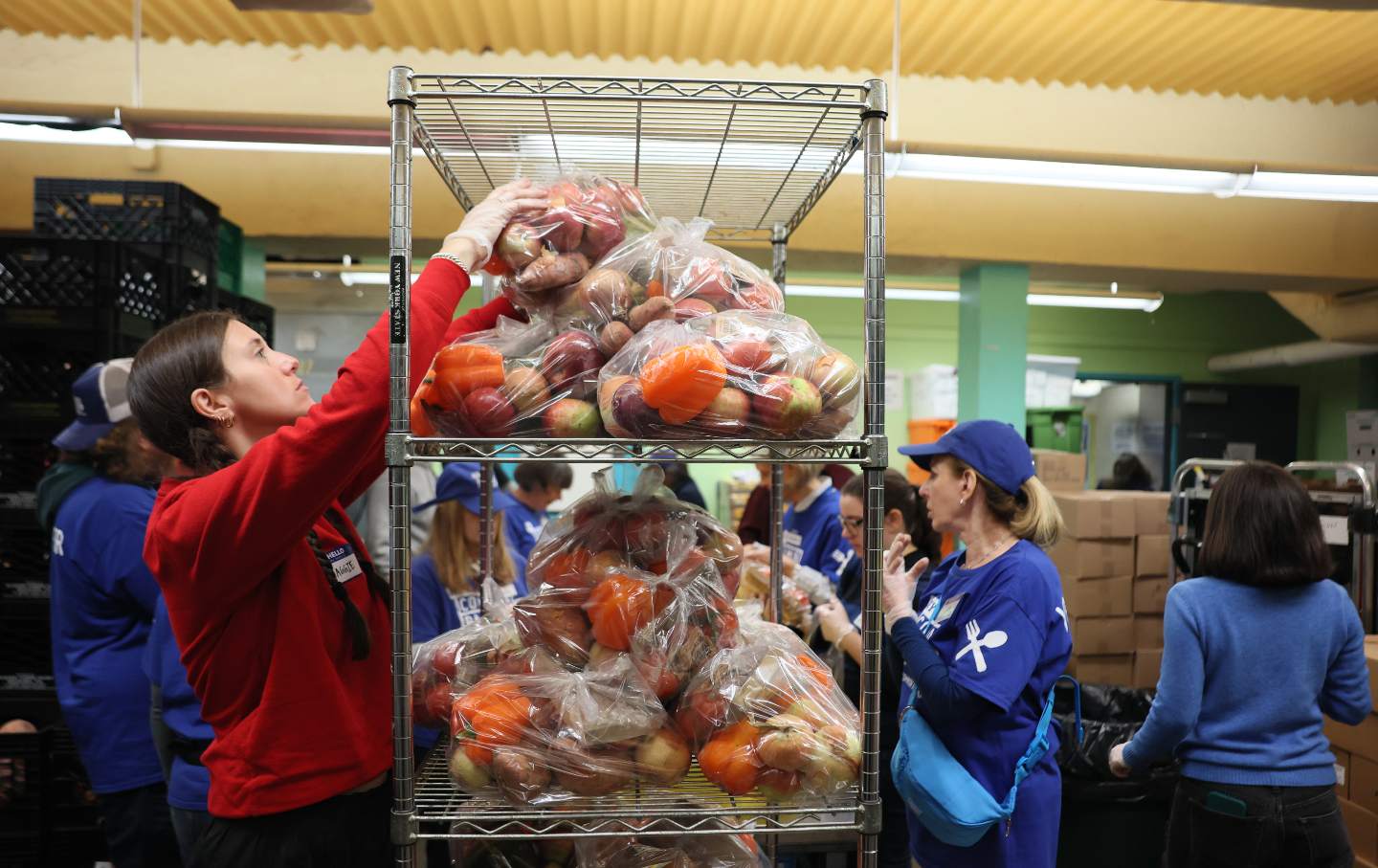Gaza Is on the Ballot All Over America
Inspired by Michigan’s unexpectedly high “uncommitted” vote, activists across the country are now mounting campaigns to send Biden a pro-cease-fire message.

A pro-Palestine protest in Seattle on November 24, 2003.
(Chin Hei Leung / Sipa USA via AP)Joe Biden did not directly acknowledge the fact that one out of every seven Michigan Democrats who cast ballots in that state’s February 27 presidential primary skipped over his name and voted “uncommitted” in response to a last-minute campaign to get the president to end US support for Israel’s assault on Gaza. But when Vice President Kamala Harris used the dramatic backdrop of Selma’s Edmund Pettus Bridge on Sunday to reiterate the Biden administration’s desire for a six-week cease-fire in the region—after Biden announced plans for limited airdrops of food supplies into Gaza—organizers of the Listen to Michigan movement that secured the unexpectedly high “uncommitted” vote announced, “Despite the naysayers in the establishment, the Biden administration is moving because of the pressure from uncommitted voters.”
That wasn’t a declaration of victory from the activists, who want a permanent cease-fire and an end to US military aid to Israel. But it was an argument that the movement to use primary ballots as a way to demand an end to the death and destruction in Gaza is having an impact—not just on politics but on policy.
The question now is whether more “uncommitted” votes cast in more primaries might infuse Biden and his team with the sense of moral urgency that has been lacking since the government of Israeli Prime Minister Benjamin Netanyahu responded to the October 7 Hamas attack on Israel with a full-scale military assault on Gaza that has killed upwards of 30,000 Palestinian civilians—more than 12,000 of them children. The answer will come from states across the country, where activists have picked up the “uncommitted” banner and are running with it.
More than two dozen states permit voters to cast “uncommitted,” “undeclared” or “no preference” ballots. In each case, if 15 percent of voters statewide, or in individual congressional districts, choose one of these options, they will send delegates with no obligation to back Biden to the Democratic National Convention in Chicago, where they could raise the issue of Gaza.
After months of marches, rallies, and protests, activists say there is now an electoral mechanism for raising the issue, and supporters of an immediate and permanent cease-fire are seizing it as a vehicle to “get a message to Biden” about his moral responsibility to stop the killing—and his political responsibility to listen to constituencies he’ll need to beat Donald Trump in November.
“Finally, we realized the most powerful tool we have in our grasp is the power to vote,” says Rami Al-Kabra, a Palestinian American city council member in the Seattle-area city of Bothell, who is working with Washington state’s “uncommitted” campaign ahead of its March 12 primary.
The Washington campaign gained traction last week, when the executive board of the state’s largest union, United Food and Commercial Workers Local 3000, called for an “uncommitted” vote, stating,
We need a nominee who can run and beat Trump to protect workers across this country and around the world.
We stand in solidarity with our partners in Michigan who sent a clear message in their primary that Biden must do more to address the humanitarian crisis in Gaza.
Biden must push for a lasting ceasefire and ending US funding toward this reckless war.”
In addition to Washington, “uncommitted” campaigns have emerged in several states, including Colorado, Minnesota, Massachusetts, North Carolina, Pennsylvania, Arizona, and Wisconsin. National groups, such as Our Revolution, Progressive Democrats of America, Democratic Socialists of America, and Jewish Voice for Peace Action, are backing the rapidly expanding national effort by more states to replicate the Michigan result.
The Michigan “uncommitted” vote—and its potential influence on the White House—gained significant attention from the media and from commentators on the right and the left. While congressional Republicans, such as US Representative Jim Banks (R-Ind.), griped after Biden announced the airdrops that the president was “basing his foreign policy on a Michigan election,” supporters of Palestinian rights took to social media with messages declaring, “Thank you, Dearborn. Thank you, Michigan primary.”
Dearborn, the city with the largest per capita Muslim population in the US, cast 56 percent of its votes for the “uncommitted” option on the Michigan ballot, while, statewide, the “uncommitted” campaign launched just three weeks before the primary won more than 100,000 votes and picked up two delegates to the DNC.
Biden still won, but the strength of Michigan’s “uncommitted” vote was widely noted even by Biden backers. “One hundred thousand uncommitted voters in Michigan shows the problem with Joe Biden’s current course in Gaza,” observed US Representative Mark Pocan (D-Wis.). “Time to wake up to the growing human rights concerns that many Americans have. And to recognize Netanyahu isn’t the ally some claim he is.”
Popular
“swipe left below to view more authors”Swipe →Asked on CNN if he thought that the Michigan vote was a warning sign for the White House, Senator Bernie Sanders I-Vermont, said, “I think it is. I think people all over this country are looking at what’s going on in Gaza and really cannot believe what they are seeing. It’s not only that 30,000 Palestinians have been killed, and 70,000 wounded—two-thirds of them women and children—but what we are looking at at this moment is the starvation of hundreds of thousands of children. And that is because of Israeli bombardments and that is because of restrictions at the border preventing humanitarian aid from getting in. This is absolutely unacceptable. In my view, and I have said this a million times, the United States should not be giving Netanyahu and his extreme rightwing government another nickel for their war efforts that are killing so many innocent Palestinians.”
It is the hope that Biden can be moved toward that level of clarity that has inspired activists across the country to borrow a page from Michigan and start campaigns like the one in Washington State, which just won the endorsement of Seattle alternative weekly newspaper The Stranger. While the paper’s editors—like many supporters of “uncommitted” campaigns—said they would back Biden over Trump in a November race, they explained, “Joining a movement to vote for uncommitted delegates to support a ceasefire gives us the rare opportunity to speak directly to the president on this issue, and the humanitarian disaster unfolding in Gaza is simply far too dire not to take advantage of that opportunity.”
Support independent journalism that does not fall in line
Even before February 28, the reasons for Donald Trump’s imploding approval rating were abundantly clear: untrammeled corruption and personal enrichment to the tune of billions of dollars during an affordability crisis, a foreign policy guided only by his own derelict sense of morality, and the deployment of a murderous campaign of occupation, detention, and deportation on American streets.
Now an undeclared, unauthorized, unpopular, and unconstitutional war of aggression against Iran has spread like wildfire through the region and into Europe. A new “forever war”—with an ever-increasing likelihood of American troops on the ground—may very well be upon us.
As we’ve seen over and over, this administration uses lies, misdirection, and attempts to flood the zone to justify its abuses of power at home and abroad. Just as Trump, Marco Rubio, and Pete Hegseth offer erratic and contradictory rationales for the attacks on Iran, the administration is also spreading the lie that the upcoming midterm elections are under threat from noncitizens on voter rolls. When these lies go unchecked, they become the basis for further authoritarian encroachment and war.
In these dark times, independent journalism is uniquely able to uncover the falsehoods that threaten our republic—and civilians around the world—and shine a bright light on the truth.
The Nation’s experienced team of writers, editors, and fact-checkers understands the scale of what we’re up against and the urgency with which we have to act. That’s why we’re publishing critical reporting and analysis of the war on Iran, ICE violence at home, new forms of voter suppression emerging in the courts, and much more.
But this journalism is possible only with your support.
This March, The Nation needs to raise $50,000 to ensure that we have the resources for reporting and analysis that sets the record straight and empowers people of conscience to organize. Will you donate today?
More from The Nation

We Don’t Need an Autopsy to Tell Us the Democrats Failed on Gaza We Don’t Need an Autopsy to Tell Us the Democrats Failed on Gaza
The DNC is allegedly hiding a report showing that Kamala Harris’s Gaza policy helped cost her the 2024 election. But that report won’t tell us anything we don’t already know.

Texas’s Senate Primary Has Already Made History—and It’s Not Over Yet Texas’s Senate Primary Has Already Made History—and It’s Not Over Yet
Democratic nominee James Talarico is getting national media attention, but the real story is sky-high voter turnout, even amid GOP bids to suppress balloting

Quilted Messages Quilted Messages
Sunbonnets carrying not-so-sunny truths.

How the Theatrics of Mamdani’s Trump Meeting Backfired How the Theatrics of Mamdani’s Trump Meeting Backfired
By pandering to the president’s vanity, the New York mayor reinforced Trump’s image as a strongman commanding deference—an especially bad look on the eve of Trump’s war with Iran

Students in New York Are Going Hungry. How Can Mamdani Help? Students in New York Are Going Hungry. How Can Mamdani Help?
With plans for city-owned grocery stores and a focus on affordability, the new mayoral administration offers fresh hopes of successfully confronting the food crisis among students...

We Are the Fire That Melts the ICE We Are the Fire That Melts the ICE
Oaxaca, Mexico, street art.


